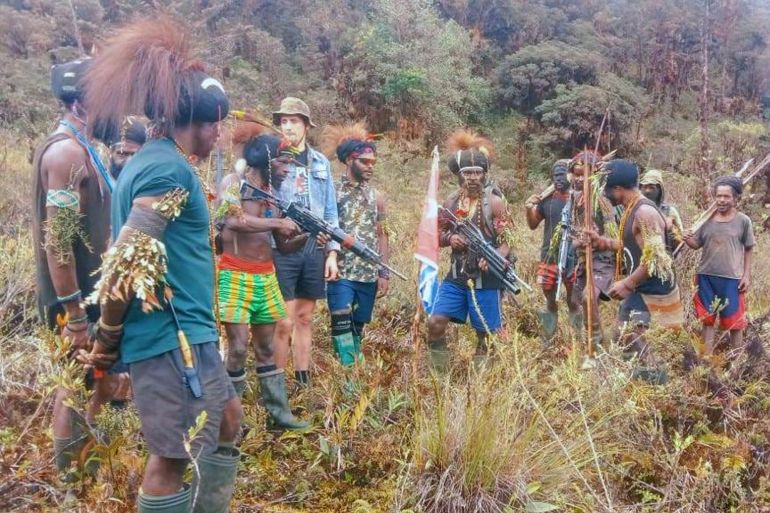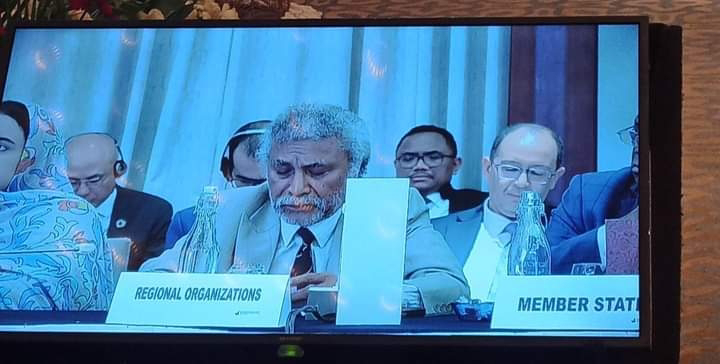There were 27 cases of buying and selling of weapons and ammunition by members of the military to rebel groups, says army chief
The Commander-in-Chief of the Indonesian National Army, Admiral Yudo Margono (middle) said there had been 27 cases of buying and selling weapons and ammunition in 2022 by members of the military to Papuan rebels. (Photo: Indonesian National Army)
There were 27 cases of buying and selling of weapons and ammunition by members of the military to rebel groups, says army chief
Concern in Indonesia over illegal arms supply to Papuan rebels
There were 27 cases of buying and selling of weapons and ammunition by members of the military to rebel groups, says army chief
Concern in Indonesia over illegal arms supply to Papuan rebels
The Commander-in-Chief of the Indonesian National Army, Admiral Yudo Margono (middle) said there had been 27 cases of buying and selling weapons and ammunition in 2022 by members of the military to Papuan rebels. (Photo: Indonesian National Army)
UCA News reporter
Published: May 16, 2023 11:15 AM GMT
An Indonesian Catholic lawmaker has called on the army chief to explain the alleged sales of arms and ammunition to rebel groups by military forces in the restive Christian-majority Papua region.
"This matter is very serious and we in parliament certainly want to hear a full explanation from the Commander of the Indonesian Armed Forces," said Christina Aryani, a lawmaker on the parliamentary commission related to defense, foreign affairs, communications, informatics, and intelligence.
During a media briefing on May 16, Aryani said the case of arms sales to rebels deserves attention so that effective prevention and action steps could be taken immediately.8
More universal than Catholicism?
Mary among Asian religions
She responded after military chief Admiral Yudo Margono made public a report on May 6 that says there had been 27 cases of buying and selling of weapons and ammunition in 2022 by members of the military to Papuan rebels, a drastic increase from one case reported in 2021.
"We appreciate the openness from the military on this matter which certainly makes it easier to stop this practice immediately," Aryani said, adding that she wants to discuss the issue in detail to find out patterns, actors, and locations of such practices.
"We don't want this very crucial matter to go away without a clear resolution," she said.
She stated that this kind of practice is "very inhumane because it is the same as giving way to killing fellow soldiers and terrorizing civilians."
Jones Douw, a Papua-based human rights activist and chairman of the Justice and Peace Department at Kingmi Church told UCA News that this is not a new problem but has been going on for a long time, both individually and in groups.
"It's just a shame that it really isn't being taken seriously. Even though this is an embarrassing matter that should be a serious record for the Indonesian government," he said.
Jones cited several previous cases, including three soldiers who were fired and jailed for life in February 2020 for selling weapons and thousands of rounds of ammunition to pro-independence groups and another case on March 12, 2020, where a soldier was also jailed for life for selling firearms and 1,300 ammunition.
"When things like this recur, it's hard not to say that the conflict in Papua is sort of being allowed to," he said.
"On the one hand, the Indonesian apparatus has always claimed to be carrying out various forms of operations to crush pro-independence groups, but is instead arming them," he said.
Made Supriatma, a research fellow at the Institute of Southeast Asian Studies in Singapore who specializes in Indonesian security and military issues, said that this practice continues because of economic factors.
Soldiers or police "want to take risks because the economic value is large," he said.
"One SS-21 gun costs 250 million rupiah (US$ 16,866) and the guerrillas are more than willing to get it," said.
In a July 2022 report entitled Escalating Armed Conflict and a New Security Approach in Papua, the Institute for Policy Analysis of Conflict (IPAC) stated that the West Papua National Liberation Army (TPN-PB), labeled as an armed criminal group by the Indonesian government, is one of the rebel groups that received an increasing number of manufactured firearms.
The report stated that the TPN-PB is estimated to have 400-450 manufactured firearms of various types, from SS-1, M4, and M16, obtained by seizing or buying them from the military and police.
TPNPB gets money to buy weapons in various ways, ranging from ransoms for hostages, extorting local business owners, donations from sympathizers, and misappropriation of village funds provided by the government, it stated.
Papua declared independence in 1961 after the Dutch colonial rule ended. However, Indonesia annexed the territory within two years, promising to have an independence referendum. The subsequent voting in favor of staying as part of Indonesia was widely considered a sham.
Indonesia’s occupation of Papua triggered an armed struggle for independence. The government responded with a heavy military presence to suppress the insurgency. The conflict left thousands dead and tens of thousands displaced.
Currently, about 16,900 military soldiers with combat skills are stationed in Papua, according to the advocacy group, Imparsial.
Last month, the military beefed up combat operations in the region following the killings of five soldiers by the TPN-PB. The soldiers were killed during the efforts to free New Zealand pilot Phillip Mehrtens, who has been held hostage since February.
































